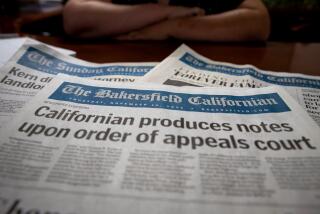Court Orders Lincoln’s Parent to Return Tape
- Share via
The Arizona Supreme Court ruled Wednesday that tape recordings containing confidential information about Lincoln Savings & Loan of Irvine and one of its borrowers must be returned to a newspaper reporter who conducted the interviews.
The court, without comment, rejected arguments that the recordings were, in effect, stolen property because the information should not have been released to the public.
The tape recording contains interviews by Phoenix Gazette reporter Leslie Irwin with unidentified thrift regulators and others about Lincoln Savings and its loans to developers, including Conley Wolfswinkel of Tempe, Ariz.
Details of the interviews have not been divulged, but lawyers for Wolfswinkel and Lincoln’s parent company, American Continental Corp. of Phoenix, say regulators discussed details of loan transactions and other financial dealings with Irwin.
Charles H. Keating Jr., chairman of American Continental, has said the tape supports his longstanding claims that agents of the Federal Home Loan Bank Board have repeatedly leaked confidential information about Lincoln.
Regulators have denied that they divulged secret data to reporters or anyone else outside the regulatory system.
American Continental filed a bankruptcy petition April 13 to protect itself from creditors while it tries to reorganize its debts under Chapter 11 of the federal bankruptcy laws.
The bank board took over operations of Lincoln the next day, saying American Continental was operating it unsafely and dissipating its $5.3 billion in assets.
In covering developments at American Continental and Lincoln Savings, Irwin inadvertently left a cassette tape at Wolfswinkel’s office, where she had interviewed the commercial real estate developer on June 2.
Wolfswinkel listened to the tape and gave it to his lawyer, Barry Tarlow of Los Angeles, who turned it over to one of American Continental’s lawyers, A. Melvin McDonald, at McDonald’s request.
McDonald said he sent a copy of the tape to the Public Integrity Section of the U.S. Department of Justice and turned the original over to the FBI office in Phoenix to investigate his complaint that federal agents were illegally disclosing confidential information. He also made two copies, one for himself and one for Tarlow.
Wolfswinkel and the two lawyers rebuffed requests by the Gazette and reporter Leslie Irwin to return the tape, and the newspaper sought a court order. A trial court ordered the return of the tapes, and the order was affirmed on appeal by an intermediate appellate court before the issue was taken up by the state’s high court.
The Supreme Court’s order also prohibits the Gazette from contacting people whose interviews were recorded on the tape. McDonald had claimed that any such contact would compromise the criminal investigation of the alleged leaks.
Wolfswinkel is the only person interviewed whose identity has been disclosed publicly.
William R. Jones Jr., a lawyer for the defendants, said the interviews contained confidential information about Wolfswinkel’s investments, collateral and loans with Lincoln Savings.
But James F. Henderson, the newspaper’s attorney, asserted that the tape belonged to the Gazette and that McDonald fulfilled any ethical responsibility he might have had by turning over the original to the FBI.
sg
More to Read
Inside the business of entertainment
The Wide Shot brings you news, analysis and insights on everything from streaming wars to production — and what it all means for the future.
You may occasionally receive promotional content from the Los Angeles Times.










